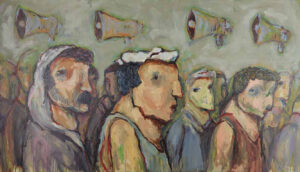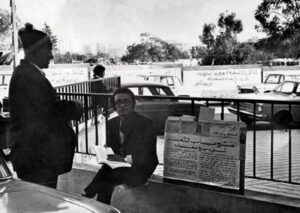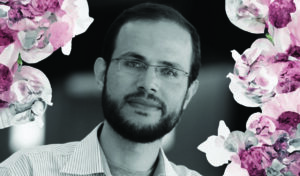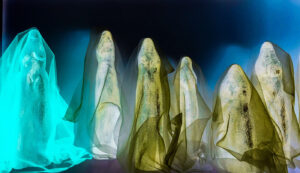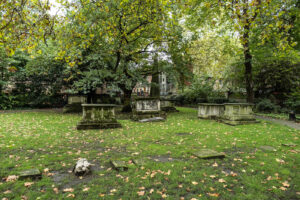An exclusive excerpt from A Brief Time under a Different Sun (Zaman saghīr taḥt shams thāniya), by Huda Fakhreddine, published by Dar al-Nahda, Beirut in 2019.
This war, too, shall pass, just as all the others that came before it did. And yet, we remain in constant anticipation of impending devastation. After so many years, war has stated its claim on our lives. It is all that occupies us. We sit waiting for it, missing its absence. There is relief in its return, a certain kind of tranquility, that comes with the conclusion of anxious anticipation.
Huda Fakhreddine
Translated from Arabic by Rana Asfour
Nothing is heavier than diaries. Nothing is lighter than days.
They are a triviality, a transience.
They dissipate, like loss, like a confession, like a glimmer in a well. There’s nothing lighter than days. So, how can they possibly pile up so heavy and burdensome in the corner, gathering dust and echoes, images and shadows? Days are scattered trivialities. They coalesce and fester in the mind. They lurk, onerous and on guard, silent and rigid like a stone.
Right here. Behind a glass pane that holds back the city from me, silent in a frame, I am aware of an impending conclusion. Nevertheless, the endings are countless and this is only but one. And this is another. So, how to prepare for each eventuality? How to orchestrate a suitable beginning for each of them?
Why do I keep recounting this cavalcade of interconnected and boundless endings? I do sense an imminent conclusion drawing near, but I am uncertain whether it is contentment or sorrow that I feel. Regardless, both represent different dimensions of failure.
Arrival
1.
The place was cramped but also familiar, as if I had been there before. I was seized by a desperate need to write. During the early days of high school, I took up journaling, and for a few years after that, I maintained the habit. However, when worthwhile events started happening, I became more invested in getting through them than writing about them. This has always left me with a feeling of inadequacy and guilt.
Here I am, now, on the ground of my bare apartment on the second street in Bloomington, trying to somewhat fulfill the promise I’d made to myself. Mind you, this isn’t my first attempt. I’ve attempted to write this text before. In English. I wouldn’t say I failed exactly, although I would say that I felt bashful at my attempt and stopped. I heard my father’s voice…and I was ashamed.
2.
Another day. I am a stranger to this country’s weather. The sky changes without my control or interference, whereas, in Beirut, the sun rose and set at my command. I find the rain ridiculous and pointless in this place where nobody pays heed to the color of the clouds or listens to the babblings of the rain.
3.
Another day in Indiana. The sun doesn’t rise in this country. It is always there. I wake up to find it waiting for me, ready to start a new day. I’ve made attempts to awake earlier to catch the sunrise, but I haven’t succeeded yet. The day seems merely to happen here, in this place where night and day fail to converse — I doubt they’ve even met. I suppose that’s why … the sun doesn’t rise in this country.
4.
As soon as I’d arrived from Lebanon, I was instructed to head into campus for some necessary orientation lectures. Last night, I retraced the paths of the expansive campus grounds that I had failed to familiarize myself with, losing my way time and time again.
The students occupying this sprawling campus had come from all over the world seeking an education — or its equivalent. Yet irrespective of our individual aspirations, we were collectively categorized as the ‘International Students.’” It appears we had journeyed the ocean solely to be at the receiving end of a blonde woman’s lecture on how to protect our legitimate right to be in the United States of America. Hanging on to the very edge of the podium placed in the center of the hall, she appeared to lean towards us —a gesture deigned as a show of kindness to the minorities and marginalized. Her long blonde hair was in a braid that ran down her back, while a few short stray hairs swiped her forehead, which she would occasionally flick to keep away from her eyes. She told us how much she, and indeed every American, appreciated and respected our diverse cultures, languages, traditions and identities. I looked towards the person sitting beside me, and both of us, the Lebanese and the Korean, appeared humbled by her overwhelming sentiments of respect and appreciation.
The woman extrapolated on how the United States welcomed our potential, our ideas, our hopes and dreams. Regardless of all that, she went on to say, we should never forget to renew our papers at the designated offices where we were assured that everyone would be happy to lend a helping hand. Failure to do so would, alas, force this highly appreciative institution, its respected nation and its helpful governmental office to revoke our re-entry into this extremely welcoming country.
5.
I left the hall and walked with a group of strangers, just like me, behind a man in a red shirt, explaining how to navigate the university campus while pointing out the various buildings around us. I cannot explain the strong connection that I felt for this group. I question whether my sentiment was one of pity not only for them but also for myself. I doubted anyone was listening to anything the man in the red shirt was saying, despite his impressive efforts to be of help to this group of foreigners. Listening to our guide speak of maps and signs evoked a strong sense of loneliness within me. I wondered how I could navigate my way through the unfamiliar labyrinths of this country, considering I had come from Lebanon, a place in which every direction one took brought with it a familiar salutation —a sense of homecoming.
The young man next to me extended his hand in my direction and said something I didn’t understand. I shook his hand and apologized that I hadn’t heard what he’d said. He tried again and again and I failed to make sense of his words. My name. This is my name and I’m from Kyrgyzstan. You? He couldn’t pronounce my name, but he did recognize Lebanon. He said he’d heard that Beirut was a beautiful city. He was happy to learn that I was studying in the department of Middle Eastern Language and Literature as he was majoring in the cultures of Central Asia. I do recognize the irony of the Arab coming to America to pursue Arabic and Arabic literature as my Kyrgyz colleague searches for his country within the spacious corridors of the gigantic buildings in which he continually gets lost. He confessed that he’d lost all sense of direction, and now only relies on maps and signs.
6.
There’s salt and sugar in the house now. I’ve placed a little of each in a small paper plate. They’re not just any sugar or salt. They are mine and mine alone. Today, I crossed to the other side of the city, to one of the larger stores, to shop for home necessities. It’s been two days since my arrival from Lebanon, and I need to turn my house into a home. I’d made a list. But when I got to the store, I was lost in its labyrinth of endless aisles. Sadness soon overwhelmed me. I felt adrift amongst this forest of plates, cans, home appliances, meats, strangers, bright words, and copious amounts of sugar and salt. Who needs so much sugar and salt? Why? I chose two packets and told myself they’d be the salt and sugar of my future, day after day, after day. Time felt bloated and heavy, as my feet slowly shuffled forward. In that aisle, amongst the shelves laden with packages of sugar and salt, I crossed into my new life. The one in which I was and would be alone with myself, my house and my time. The life in which I was solely responsible for monitoring that the sugar and salt never ran out.
First Summer – War
Summer conceals sorrows that peak from behind its blue skies and orange horizons. Summer has a peculiar longing that settles in at the beginning of the night, when the sky opens up and directions become muddled. Summer carries a familiar scent that spreads along the ripples of the night, carried on by the trees and the approaching hills.
1.
Tomorrow, I return after a year’s absence. I leave this place with a sense of regret, as though I am leaving behind various loose ends. I am bewildered by this return, unsure how to prepare for it. Do I pick a suitable outfit for the occasion? Do I rehearse my reactions? Which of these do I pack in my purse: expectation or fear? Joy or anxiety? How do I return to a place that I feel I never truly departed? I am filled with trepidation at the thought of how it will receive my return.
2.
The moment the plane touched down in Beirut, I prepared to begin documenting my summer vacation in my journal. I had assumed my entries would center around the sea, the cafés, the books and the parties. But, unbeknownst to me, war had chosen the summer of 2006 to traipse once more through the streets of Beirut.
3.
Another day under siege. This morning we missed the sounds of shelling. Since we learned that the enemy had switched to advanced, quieter, machinery, we have found ourselves awaiting the sound of any detonation to rupture the prevailing silence and alleviate our isolation. We’ve lost all sense of bearing. Even silence has become an unpredictable adversary capable of betrayal at any given moment.
4.
The household is brimming with viewpoints, sighs, and expectant looks of apprehension. My grandfather has been sitting in the same chair for three days. In his hand, the radio nestles, as his eyes roam, bleary and unfocused. I wonder at the countless wars he’s witnessed, and at the times his heart has beaten furious and in fear. The sound of radio static brings him solace — a lifelong bond that has supported him through every war. After years spent following Israel’s military operations in his southern village, he has become an expert on every maneuver. He’s rebuilt his home dozens of times and each time the vine caught fire, he made sure to replant it once more. Its constant resurrection bears witness to the cycle of life and death, as well as the rhythm of sunrises and nightfall.
5.
The Beirut lighthouse burned down last night. When my brother Ali and I were young, my father would take us to the Corniche to watch its light turn and turn. Yesterday, the entire lighthouse was engulfed in flames setting Beirut’s night ablaze.
6.
In my grandfather’s garden stands an ancient almond tree. There, in that corner, I remember how it seemed to lean against the stone wall. Contemplative, the tree bore into the distance, as though anxiously awaiting something to emerge from behind the distant hills. Following every offensive, a part of her went up in flames, so that it became far shorter and far stiffer than any of its kind should ever be. Following every attack, the pomegranate trees shrunk inwards tucking their luxuriant foliage around them, whereas the almond tree resolutely maintained its position, assuming its contemplative upright posture. From its vantage point behind the wall, it fixed its gaze upon the distant horizon, observing the billowing columns of black smoke rising from behind the far-off hills.
My grandfather now sits in the same chair, perhaps, contemplating the very tree and the fountain he built in the yard over thirty years ago. In a Beirut apartment, my grandfather sits alert and waiting. He can hear the echoing sounds of shelling from outside, ricocheting around the corners of the room. I imagine he is wondering if the almonds are spooked, if the Cypresses are trembling, and if the Olive trees have cowered down shedding tears.
7.
My grandmother sits on the sofa in front of the TV. She gently extends her left leg upon the small table in front of her. Her knee throbs with pain whenever she’s obliged to remain seated for extended durations. Her lengthier stay in Beirut keeps her from joining her companions in their leisurely walks along Darb Al Ayn, where they frequently gather to survey the olive groves, and make arrangements for future picnics along the paths they visited during bygone reunions.
As her knee throbs, she extends her leg while attempting to keep pace with the constant stream of breaking news scrolling along the bottom of the screen. Before she can finish reading one headline, another promptly replaces it. They are all urgent. There is no power and no strength except with God. How did we end up like this? she asks grandfather, gesturing towards the images of destruction being broadcast live on air. From his corner of the room, he gestures to her with his hand indicating for her to wait and listen to the latest breaking news coming in on the radio. So, she stops talking. In unison, they listen, driven by a deep-seated fear of overlooking even the most inconsequential piece of information, and acutely aware that neglecting a solitary detail, regardless how minor, could cause the war to seep away from their grasp.
8.
At Vienna Airport I await a plane that will fly me through time. This summer I returned to Lebanon, and the places that I looked forward to seeing came along with me. And yet, on arrival I couldn’t seem to find any of them.
Summer bears hidden sorrows that take us by surprise. This year, Summer did away with its timid illusions and instead kept us busy with the horrors we had long been primed to expect.
This war, too, shall pass, just as all the others that came before it did. And yet, we remain in constant anticipation of impending devastation. After so many years, war has stated its claim on our lives. It is all that occupies us. We sit waiting for it, missing its absence. There is relief in its return, a certain kind of tranquility, that comes with the conclusion of anxious anticipation.
It is the wait; Time growing narrower and narrower.
Second Summer – Death
1.
That summer, I found myself on a date with death. All through my flight, I stressed about the inappropriateness of my clothes for the occasion. I didn’t feel sad and I wasn’t distraught. I remember gazing out of the oval windows of the plane, conscious of what I was wearing and what I could have worn. I didn’t have any idea how to prepare for a loss that hadn’t yet happened.
Fleeting clouds crossed listlessly before me at that altitude where one loses all sense of direction. Throughout the entirety of my journey, I remained oblivious to the immense distances, the depths of the dark ocean, and the steadily accumulating hours. I busied myself by carefully studying the corners of the seat in front of me, the hairline cracks on its drop-down tray, and the droplet of water hesitantly making its way along the window pane. The plane landed suddenly, the sky receding in enigmatic anticipation of what was to come. My grandfather had not yet died.
2.
When I entered the room, my grandfather hadn’t died. He was lying on the bed. The tall man in my recollections appeared to be a little shrunken. The big man, rendered slightly smaller. His buoyant eyes, confused.
When I entered the room, my grandfather noticed my presence. He hadn’t died yet. He was attentive, as a small cloud hovered above us. I reached for his hand, sandwiching it between my own, and sat basking in the warmth of his welcome. He ladled me with questions I promised myself I would never forget. Happy, disjointed inquiries like the ones we were accustomed to asking each other, as friends. We had our own special language, our own ritual of speech.
How are you? I’m glad you came. Do you see how much the others bore me? He was jocular, belittling death, who he knew sat lurking in the corner of the room. Your poetry, your writing, your dissertation, are you done with all that? And Abu Tammam, your friend, is he giving you grief? Let’s be gone from here. Don’t the others bore you?
3.
The windows darkened, and the visitors left.
Seeking my permission to rest awhile, he closed his eyes, promising to return to me soon. As I sat in the chair beside him, I was captivated by the sight of his slumbering hand, occasionally twitching as if attempting to grasp at something, before surrendering in despair.
4.
From behind the glass pane in the intensive care unit, I witnessed my grandfather’s hands surrender. In a glass room teeming with nurses, my grandfather relinquished the trivialities of life he had clung to for eighty years. He appeared content as he bid the call that only he could hear in a tumultuous room that Death had crossed into.
5.
We placed my grandfather in the trunk of the car and drove him south, he who used to steer us all — children and grandchildren. He who sheltered, and guided us; brought us together and taught us; chastised us and yet made us laugh. He launched us into this troubled world, cushioning our footfalls with his own fears, and noble aspirations.
The night my grandfather died, he slept in his bed, at home, in his southern village. We all gathered around him as we would normally do. Despite his silence, he appeared to be the only one speaking. There never was a voice louder than my grandfather’s, never a silence more shattering.



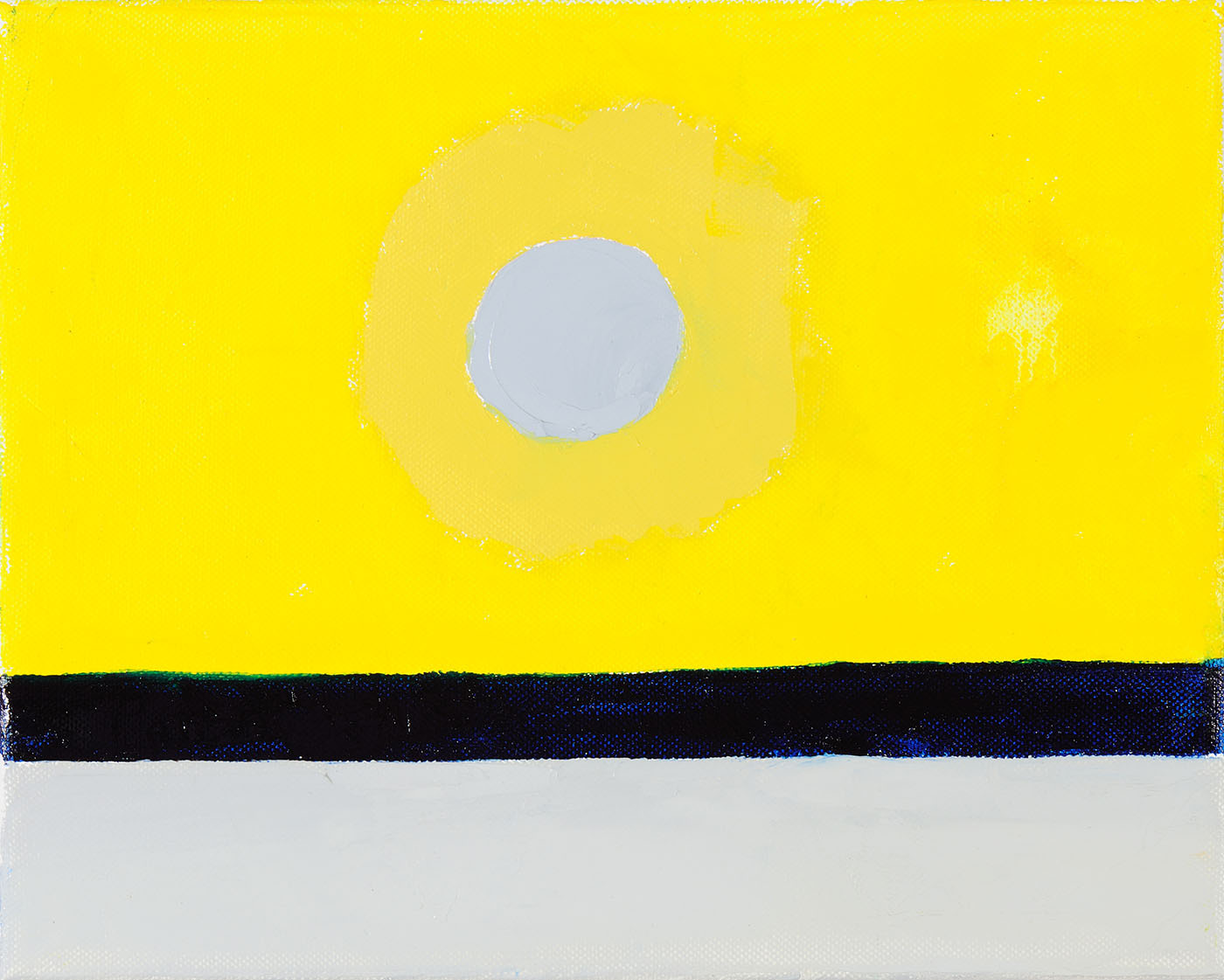







![Ali Cherri’s show at Marseille’s [mac] Is Watching You](https://themarkaz.org/wp-content/uploads/2025/09/Ali-Cherri-22Les-Veilleurs22-at-the-mac-Musee-dart-contemporain-de-Marseille-photo-Gregoire-Edouard-Ville-de-Marseille-300x200.jpg)

